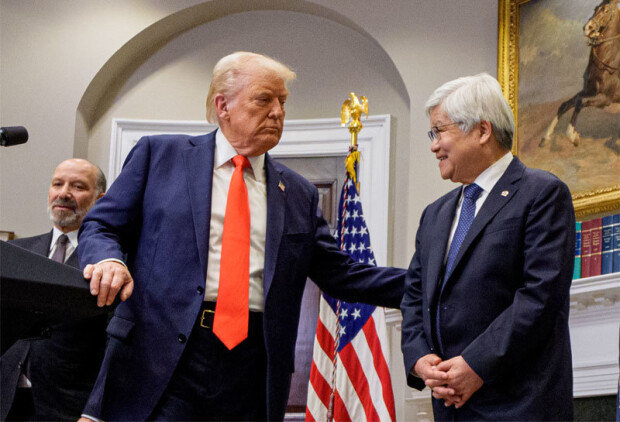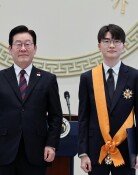U.S.-China tariff war escalates
U.S.-China tariff war escalates
Posted March. 05, 2025 07:46,
Updated March. 05, 2025 07:46

The trade war between the United States and China is intensifying. As promised, President Donald Trump signed an executive order on Monday (local time) to impose an additional 10% tariff on Chinese imports, taking a tougher and swifter approach to trade policy toward China than during his first term. In response, China quickly retaliated.
Following the enactment of the U.S. tariffs at Tuesday midnight (Eastern Time, 2 p.m. KST), China announced that it would impose a 15% tariff on U.S. poultry, wheat, corn, and cotton starting next Monday. Additionally, a 10% tariff would be levied on soybeans, sorghum, pork, beef, seafood, fruits, vegetables, and dairy products. Furthermore, China decided to place 15 American companies, including defense contractors General Atomics and General Dynamics Land Systems, on a sanctions list.
President Trump signed the executive order at the White House on Monday, marking the second round of additional tariffs following a 10% tariff hike last month. He justified the move by citing China’s inadequate efforts to curb the inflow of fentanyl and other narcotics into the United States. With this new measure, the total additional tariffs imposed on China by Trump’s second-term administration have now reached 20%.
Trump also announced that, starting on Tuesday, the U.S. would impose 25% tariffs on Canada and Mexico, which share a border with the United States. Although the two nations had been granted a one-month exemption last month while they worked to address fentanyl trafficking and illegal immigration issues, they ultimately failed to avoid what has been dubbed a "Trump tariff bomb." In retaliation, Canada has decided to impose counter-tariffs on 155 billion Canadian dollars worth of U.S. imports, further escalating the trade conflict among North American countries.
Meanwhile, Taiwan Semiconductor Manufacturing Company (TSMC), the world’s largest semiconductor foundry and a leading Taiwanese firm facing military threats from China, has committed to investing 100 billion U.S. dollars in the U.S. over the next four years. Trump met with TSMC Chairman C.C. Wei at the White House on Monday to discuss the investment and took the opportunity to criticize China for artificially devaluing the yuan to boost exports. He asserted, "Tariffs are the answer. They are simple, fast, efficient, and enable fair trade." Trump also accused China and Japan of manipulating currency to support their exports, emphasizing, "If we impose tariffs, there’s no need for negotiations with their leaders on this matter."
Jin-Woo Shin niceshin@donga.com



![8년전 한밤 중 목욕탕에 나타난 김정은, 분노한 이유는 [주성하의 ‘北토크’]](https://dimg.donga.com/c/138/175/90/1/wps/NEWS/IMAGE/2026/01/23/133210584.1.jpg)
![[광화문에서/김준일]단식 마친 장동혁… 중요한 건 단식 그 다음](https://dimg.donga.com/c/138/175/90/1/wps/NEWS/IMAGE/2026/01/23/133221688.1.jpg)

![라면 먹고도 후회 안 하는 7가지 방법[노화설계]](https://dimg.donga.com/c/138/175/90/1/wps/NEWS/IMAGE/2026/01/23/133219600.3.jpg)
